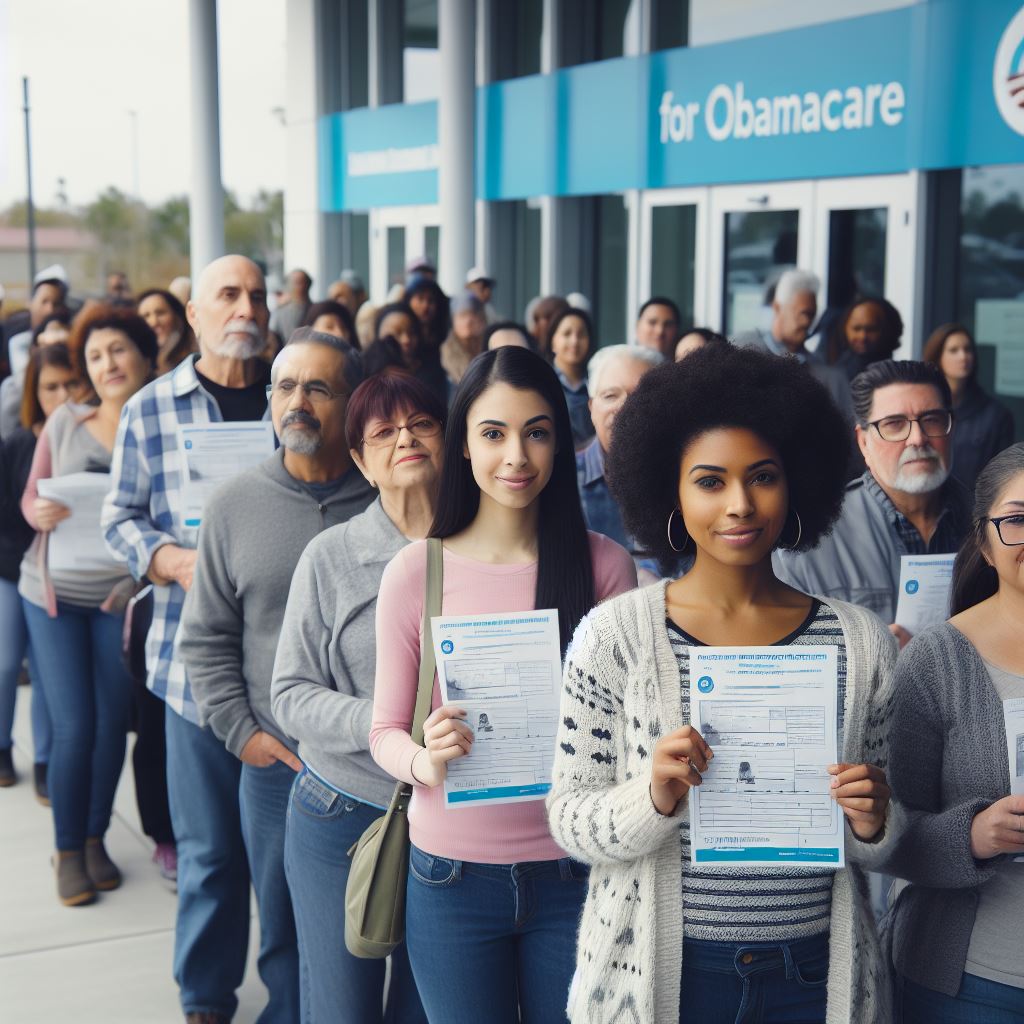15 Tips: Who Can Enroll for Obamacare?

Are you ready to navigate the maze of Obamacare enrollment? Look no further! In this article, we’ve compiled 15 tips to help you understand who is eligible for this healthcare program.
From full-time employees to unemployed individuals, from small business owners to low-income families, we’ve got you covered.
So, grab a cup of coffee and get ready to unravel the complexities of Obamacare enrollment. Let’s dive in!
Key Takeaways
- Full-time employees and part-time employees who work at least 30 hours per week are eligible to enroll in Obamacare for affordable and comprehensive health insurance coverage.
- Self-employed individuals can also enroll in Obamacare by meeting eligibility requirements.
- Special enrollment periods are available for certain life events such as loss of job-based coverage, marriage, divorce, birth, adoption, and relocation.
- Undocumented immigrants face challenges in enrolling in Obamacare due to citizenship requirements, but they can still receive emergency medical care regardless of ability to pay.
Full-Time Employees
As a full-time employee, you can enroll for Obamacare. This healthcare program, also known as the Affordable Care Act, provides individuals with access to affordable and comprehensive health insurance coverage. By enrolling in Obamacare, you can ensure that you have access to essential health benefits, such as preventive services, prescription drugs, and hospitalization. Additionally, Obamacare protects you from being denied coverage or charged higher premiums due to pre-existing conditions.
To enroll in Obamacare as a full-time employee, you need to visit the Health Insurance Marketplace website or contact the Marketplace Call Center. You’ll need to provide some personal information, including your income, household size, and current health insurance coverage, if applicable. Based on this information, you’ll be presented with different health insurance plans that are available in your area.
It is important to note that if your employer offers health insurance coverage that meets certain criteria, you may not be eligible for subsidies through Obamacare. However, you still have the option to enroll in the employer-provided coverage or choose a plan from the Marketplace.
Now, let’s move on to the next section and discuss the enrollment options available for part-time employees.
Part-Time Employees
If you’re a part-time employee, you may be wondering if you’re eligible for Obamacare and what coverage options are available to you. The good news is that part-time employees can enroll in Obamacare as long as they meet certain criteria.
The eligibility requirements include working at least 30 hours per week or having a combination of part-time jobs that adds up to at least 30 hours per week. Once you meet the eligibility criteria, you can explore the coverage options available to you, such as purchasing insurance through the marketplace or qualifying for Medicaid or the Children’s Health Insurance Program (CHIP).
Eligibility for Part-Timers
You can enroll in Obamacare if you work part-time. The Affordable Care Act (ACA) provides coverage options for part-time employees, ensuring that they have access to affordable healthcare. To determine your eligibility, you need to consider two factors: the number of hours you work and the size of your employer. The table below outlines the eligibility criteria based on these factors:
| Hours Worked per Week | Employer Size | Eligibility for Obamacare |
|---|---|---|
| Less than 30 hours | Any size | Yes |
| 30 hours or more | Fewer than 50 | No |
| 30 hours or more | 50 or more | Yes |
If you work less than 30 hours per week, you are eligible for Obamacare regardless of your employer’s size. However, if you work 30 hours or more, your eligibility depends on the number of employees your employer has. If your employer has fewer than 50 employees, you are not eligible for Obamacare. But if your employer has 50 or more employees, you are eligible for coverage. It’s important to understand your eligibility status to ensure you have the necessary healthcare coverage.
Coverage Options for Part-Timers
Part-time employees have various coverage options under Obamacare. If you work part-time and aren’t offered health insurance by your employer, you can explore the following options:
- Marketplace plans: You can enroll in a health insurance plan through the Health Insurance Marketplace. These plans are designed to be affordable and provide essential health benefits.
- Medicaid: Depending on your income level, you may be eligible for Medicaid, a state and federal program that provides free or low-cost health coverage to individuals and families with limited income.
- Children’s Health Insurance Program (CHIP): If you have children, they may be eligible for CHIP, which provides low-cost health coverage to children in families that earn too much to qualify for Medicaid but can’t afford private insurance.
- Spouse’s plan: If your spouse or partner has health insurance through their employer, you may be able to join their plan as a dependent.
- Catastrophic coverage: If you’re under 30 years old or qualify for a hardship exemption, you can choose catastrophic coverage, which has lower monthly premiums but high deductibles.
Remember to carefully compare and evaluate your options to find the coverage that best suits your needs.
Self-Employed Individuals
Are you a self-employed individual looking to enroll in Obamacare? Understanding the eligibility requirements is crucial. In order to qualify, you must meet certain criteria such as having a business that generates income and not being eligible for other healthcare coverage options.
Additionally, it’s important to explore the special enrollment period options available to self-employed individuals, as they may provide opportunities for enrollment outside of the regular open enrollment period.
Eligibility Requirements for Self-Employed
Self-employed individuals can enroll for Obamacare by meeting certain eligibility requirements. To determine if you qualify, consider the following:
- Income: Your income must fall within the specified range to be eligible for subsidies or tax credits.
- Self-employment: You must be actively self-employed and not eligible for employer-sponsored health insurance.
- Citizenship: You must be a U.S. citizen or legal resident to participate in the healthcare marketplace.
- Enrollment period: Make sure to enroll during the open enrollment period, typically from November to December.
- Reporting requirements: As a self-employed individual, you need to accurately report your income and any changes throughout the year.
By understanding these eligibility requirements, you can navigate the Obamacare enrollment process and access affordable healthcare coverage tailored to your needs.
It’s important to stay informed and take advantage of the opportunities available to you as a self-employed individual.
Special Enrollment Period Options
To continue the discussion from the previous subtopic, if you meet the eligibility requirements, you can take advantage of special enrollment period options as a self-employed individual. These options allow you to enroll in an Obamacare plan outside of the regular open enrollment period. The table below outlines the various special enrollment period options available to self-employed individuals:
| Special Enrollment Period Options | Description |
|---|---|
| Loss of job-based coverage | If you lose your job and the health insurance that came with it, you may qualify for a special enrollment period. |
| Marriage, divorce, or legal separation | Getting married, divorced, or legally separated can trigger a special enrollment period. |
| Birth, adoption, or foster care | Having a baby, adopting a child, or becoming a foster parent can also qualify you for a special enrollment period. |
| Relocation | If you move to a new area where your current health plan isn’t available, you may be eligible for a special enrollment period. |
These special enrollment period options provide flexibility for self-employed individuals to enroll in Obamacare outside of the regular enrollment period. Now, let’s move on to discuss the options available for small business owners.
Small Business Owners
As a small business owner, you can enroll for Obamacare. The Affordable Care Act (ACA) offers several options for small business owners to provide health insurance coverage for themselves and their employees. Here are five important things to know:
- Small Business Health Options Program (SHOP): SHOP is a government program that allows small business owners to purchase health insurance plans for their employees. It offers a range of coverage options and subsidies based on the size of your business.
- Tax Credits: Small businesses with fewer than 25 full-time equivalent employees and average wages below a certain threshold may be eligible for tax credits. These credits can help offset the cost of providing health insurance to your employees.
- Individual Marketplace: As a self-employed small business owner, you can also purchase health insurance through the individual marketplace. This can be a good option if you don’t have any employees or if your employees choose to find coverage elsewhere.
- Open Enrollment Period: The open enrollment period for individuals and small businesses typically runs from November 1 to December 15 each year. During this time, you can enroll in a health insurance plan or make changes to your existing coverage.
- Employer Mandate: Under the ACA, small businesses with 50 or more full-time equivalent employees are required to offer health insurance to their employees. Failure to comply with this mandate may result in penalties.
Unemployed Individuals
If you’re currently unemployed, you may be eligible for Obamacare coverage. To qualify, you must meet certain income requirements and not have access to affordable health insurance through an employer or government program.
Enrollment options include applying through the Health Insurance Marketplace or seeking assistance from a certified enrollment counselor or navigator.
Eligibility Requirements for Unemployed
You qualify for Obamacare if you meet the eligibility requirements for being unemployed. To determine your eligibility, here are five important points to consider:
- Income: You must have a household income that falls within the eligible range based on your family size. This includes any unemployment benefits you receive.
- Citizenship: You must be a U.S. citizen or a legal resident with a valid Social Security number.
- Unemployment: You must be currently unemployed and actively seeking employment.
- Coverage Gap: If you have recently lost your job and are in a coverage gap, where you don’t have access to employer-sponsored insurance, you may be eligible for Obamacare.
- State Medicaid Expansion: Some states have expanded Medicaid eligibility to include unemployed individuals with low income. Check if your state is one of them.
Enrollment Options for Unemployed
Explore the enrollment options available for unemployed individuals seeking coverage under Obamacare.
As an unemployed individual, you have several options to enroll in health insurance through the Affordable Care Act.
The first option is to apply for Medicaid, a federal and state program that provides free or low-cost health coverage to low-income individuals and families. Medicaid eligibility varies by state, so you’ll need to check the requirements in your state.
Another option is to apply for a subsidy through the Health Insurance Marketplace. The subsidy is a financial assistance program that helps lower the cost of health insurance premiums. To apply for a subsidy, you’ll need to create an account on the Marketplace website and provide information about your income and household size.
Additionally, you may qualify for a special enrollment period if you recently lost your job and your employer-sponsored coverage. This allows you to enroll in a new health insurance plan outside of the open enrollment period.
It’s important to explore these options to find the best coverage for your needs while you’re unemployed.
Students and Young Adults
To enroll in Obamacare, students and young adults can take advantage of the affordable healthcare options available to them. Here are five ways in which students and young adults can access healthcare coverage:
- Stay on your parents’ plan: Under the Affordable Care Act, young adults can stay on their parents’ health insurance until the age of 26. This option allows students and young adults to have coverage without having to worry about finding their own insurance.
- Explore Medicaid: Depending on your income and state of residence, you may be eligible for Medicaid. Medicaid provides low-cost or free healthcare coverage to individuals and families with limited income. Check with your state’s Medicaid program to see if you qualify.
- Apply for financial assistance: If you don’t qualify for Medicaid, you may be eligible for financial assistance to help lower the cost of your monthly premiums. The amount of assistance you receive depends on your income and household size.
- Shop on the healthcare marketplace: Students and young adults can shop for health insurance plans on the healthcare marketplace. These plans offer a variety of coverage options and prices, allowing you to find a plan that fits your needs and budget.
- Consider catastrophic coverage: If you’re young and healthy, you may want to consider catastrophic coverage. These plans offer low monthly premiums but only provide coverage for major medical expenses. Catastrophic plans are a good option for those who don’t anticipate needing regular medical care.
Retirees and Seniors
Retirees and seniors have several options for accessing affordable healthcare coverage under Obamacare. Whether you are retired or approaching retirement age, it is important to understand the available choices to ensure you have adequate healthcare coverage. Here are three options to consider:
| Option | Description | Eligibility |
|---|---|---|
| Medicare | A federal health insurance program for individuals who are 65 years or older, or those with certain disabilities. | Must be 65 years or older, or have certain disabilities. |
| Medicaid | A joint federal and state program that provides healthcare coverage for low-income individuals and families, including seniors. | Must meet income and resource requirements set by your state. |
| Health Insurance Marketplace | Allows individuals to compare and purchase health insurance plans. | Available to all individuals, including retirees and seniors. Eligibility for subsidies depends on income.
Medicare is the most common option for retirees and seniors, providing comprehensive coverage for hospital stays, doctor visits, prescription drugs, and more. Medicaid can be a viable option for those with limited income and resources. The Health Insurance Marketplace offers a range of plans, allowing you to choose the coverage that best suits your needs and budget. It is important to explore all available options and consider your specific healthcare needs when deciding on the best coverage for you. Remember to review the enrollment periods and deadlines to ensure you don’t miss out on the opportunity to enroll in healthcare coverage.
Individuals With Pre-Existing Conditions
If you have a pre-existing condition, you may be wondering how Obamacare can provide you with healthcare coverage. The good news is that under the Affordable Care Act, insurance companies are no longer allowed to deny coverage or charge higher premiums based on pre-existing conditions.
Here are five important things to know if you have a pre-existing condition and are looking to enroll in Obamacare:
- Guaranteed coverage: You’re guaranteed the right to purchase health insurance even if you have a pre-existing condition. Insurance companies can’t deny you coverage or charge you more because of your medical history.
- Essential health benefits: Obamacare requires insurance plans to cover essential health benefits, including prescription drugs, hospital stays, and preventive services. This means that your pre-existing condition will be covered by your insurance plan.
- No waiting periods: Insurance companies can’t impose waiting periods for coverage of pre-existing conditions. As soon as your coverage begins, you’ll have access to the healthcare services you need.
- Pre-existing condition insurance plans: If you have been uninsured for at least six months and have been denied coverage because of a pre-existing condition, you may be eligible for a Pre-Existing Condition Insurance Plan (PCIP). These plans provide temporary coverage until you can enroll in a regular insurance plan.
- Subsidies and financial assistance: Depending on your income, you may be eligible for subsidies or financial assistance to help lower your monthly premiums and out-of-pocket costs. This can make healthcare coverage more affordable for individuals with pre-existing conditions.
Understanding your rights and options under Obamacare is crucial if you have a pre-existing condition. By enrolling in a healthcare plan, you can ensure that you have access to the necessary medical care and treatments you need.
Legal Immigrants
You can enroll for Obamacare if you are a legal immigrant. As a legal immigrant, you are eligible to receive the same benefits and options as U.S. citizens when it comes to healthcare coverage. This means that you can apply for and enroll in a qualified health plan through the Health Insurance Marketplace. To help you understand the enrollment process, here is a table outlining the key information you need to know:
| Eligibility Criteria | Documentation Required | Additional Information |
|---|---|---|
| Lawfully Present | Immigration documents | You must have proof of your legal immigration status, such as a Green Card or visa. |
| Residency | Proof of residency | You must provide documentation showing that you reside in the United States. |
| Income | Proof of income | You will need to submit documents that verify your household income to determine your eligibility for financial assistance. |
Undocumented Immigrants
Undocumented immigrants face significant challenges when it comes to enrolling in Obamacare. Citizenship requirements for enrollment restrict their access to healthcare services, leaving many without the necessary coverage.
This has implications for public health, as undocumented immigrants often delay seeking medical care, potentially leading to the spread of infectious diseases and other health risks.
Citizenship Requirements for Enrollment
To be eligible for enrollment in Obamacare, you must meet certain citizenship requirements. Here are five important things to know about these requirements:
- U.S. Citizenship: To enroll in Obamacare, you must be a U.S. citizen or a legal permanent resident.
- Undocumented Immigrants: Undocumented immigrants aren’t eligible for Obamacare coverage.
- Eligibility for Medicaid: Some states provide Medicaid coverage to pregnant women and children, regardless of immigration status.
- Emergency Services: Undocumented immigrants can still receive emergency medical care, regardless of their ability to pay.
- Mixed-Status Families: If you have family members who are undocumented immigrants, their immigration status won’t affect your eligibility for Obamacare coverage.
Understanding these citizenship requirements is crucial when considering enrollment in Obamacare.
Now, let’s move on to the next section to discuss access to healthcare services.
Access to Healthcare Services
When it comes to accessing healthcare services, it’s important to understand the options available for undocumented immigrants under Obamacare.
While undocumented immigrants aren’t eligible to purchase health insurance through the marketplace, they’re still able to seek healthcare services.
Undocumented immigrants can receive emergency medical care, including emergency room visits, regardless of their immigration status.
Additionally, many community health centers and free clinics provide healthcare services to undocumented immigrants on a sliding scale, based on their ability to pay. These facilities offer a range of services, including preventive care, vaccinations, and treatment for chronic conditions.
However, it’s important to note that undocumented immigrants may face barriers in accessing healthcare, such as fear of deportation or limited resources.
These barriers can have implications for public health, as untreated illnesses can potentially spread to the general population.
Implications for Public Health
You can better understand the potential impact on public health by considering the implications for undocumented immigrants under Obamacare. While undocumented immigrants aren’t eligible to enroll in Obamacare, their access to healthcare services can indirectly affect public health. Here are five key implications to consider:
- Limited preventive care: Undocumented immigrants may not have access to regular check-ups and screenings, which can lead to undiagnosed and untreated health conditions.
- Increased emergency room visits: Without access to primary care, undocumented immigrants often turn to emergency rooms for basic healthcare needs, leading to overcrowding and increased healthcare costs.
- Undocumented children’s health: Children of undocumented immigrants may face barriers to accessing healthcare, including vaccinations and necessary treatments, which can impact their overall health.
- Communicable diseases: Undocumented immigrants who lack access to healthcare may be more susceptible to and unknowingly spread communicable diseases, posing a risk to public health.
- Mental health concerns: Limited access to mental health services for undocumented immigrants can lead to untreated mental health issues, impacting both individuals and their communities.
Understanding the implications for undocumented immigrants is crucial in addressing public health concerns.
Now, let’s explore the impact on veterans and active military personnel.
Veterans and Active Military Personnel
If you’re a veteran or currently serving in the military, you may be wondering if you can enroll for Obamacare. The good news is that both veterans and active military personnel are eligible for healthcare coverage through the Veterans Health Administration (VHA) or the TRICARE program.
The VHA provides comprehensive healthcare services to eligible veterans, including preventive care, mental health services, and specialty care. TRICARE, on the other hand, is a healthcare program for active duty military personnel, retirees, and their families. It offers a range of healthcare options, including managed care plans and pharmacy benefits.
Under Obamacare, veterans who aren’t enrolled in the VHA can qualify for subsidies to purchase insurance through the Health Insurance Marketplace. These subsidies can help reduce the cost of monthly premiums and out-of-pocket expenses. However, it’s important to note that veterans who are already enrolled in the VHA may not be eligible for these subsidies. Additionally, active military personnel and their families aren’t eligible to purchase insurance through the Marketplace, as they already have access to healthcare through TRICARE.
Low-Income Individuals and Families
To enroll for Obamacare, low-income individuals and families can take advantage of various assistance programs. These programs are designed to ensure that those who earn lower incomes have access to affordable healthcare coverage. Here are five ways low-income individuals and families can get the help they need:
- Medicaid Expansion: Under the Affordable Care Act, many states expanded their Medicaid programs to cover more low-income individuals and families. You may qualify for Medicaid if your income falls below a certain threshold.
- Premium Tax Credits: If your income is too high for Medicaid but still falls within a specific range, you may be eligible for premium tax credits. These credits can help lower the cost of your monthly health insurance premiums.
- Cost-Sharing Reductions: If your income is below a certain level, you may qualify for cost-sharing reductions. These reductions can help lower the out-of-pocket costs, such as deductibles and copayments, associated with your health insurance plan.
- CHIP: The Children’s Health Insurance Program (CHIP) provides low-cost or free health coverage for children in low-income families. Eligibility requirements vary by state.
- Community Health Centers: Community health centers provide comprehensive healthcare services, including primary care, dental care, and mental health services, to low-income individuals and families on a sliding fee scale based on income.
Individuals With Disabilities
Individuals with disabilities can access various assistance programs to enroll for Obamacare. If you have a disability, it’s important to understand the options available to you.
One option is the Medicaid program, which provides health coverage to low-income individuals and families, including those with disabilities. Medicaid can help cover medical expenses such as doctor visits, hospital stays, prescription medications, and more.
Another option is the Children’s Health Insurance Program (CHIP), which provides low-cost or free health coverage to children in families that earn too much to qualify for Medicaid but can’t afford private insurance.
If you’re an adult with a disability and your income is too high to qualify for Medicaid, you may be eligible for subsidies to help you afford health insurance through the Health Insurance Marketplace. These subsidies can lower your monthly premiums and out-of-pocket costs.
Additionally, there are state-specific programs that provide additional assistance to individuals with disabilities. It’s important to research and understand the options available to you in your state.
Native Americans and Alaska Natives
Native Americans and Alaska Natives have specific options available to them for enrolling in Obamacare. If you’re a Native American or Alaska Native, here are five important things you should know:
- Special Enrollment Period: Native Americans and Alaska Natives have a year-round Special Enrollment Period, which means you can enroll in a health insurance plan through the Health Insurance Marketplace at any time. You don’t have to wait for the Open Enrollment Period.
- Zero Cost Sharing: As a Native American or Alaska Native, you may be eligible for zero cost sharing, which means you may not have to pay out-of-pocket costs like copayments, deductibles, or coinsurance for certain services. This applies to services received from Indian Health Service facilities, tribal health programs, and urban Indian organizations.
- Tribal Plans: Native Americans and Alaska Natives have the option to enroll in a Tribal Health Program or a qualified health plan offered by a tribe. These plans may provide additional benefits and services specific to your tribe.
- Medicaid and CHIP: If you’re a Native American or Alaska Native and your income is below a certain level, you may qualify for Medicaid or the Children’s Health Insurance Program (CHIP). These programs provide free or low-cost health coverage to eligible individuals and families.
- Indian Health Service: Native Americans and Alaska Natives can continue to receive care through the Indian Health Service (IHS). You can use your IHS benefits in combination with health insurance coverage obtained through the Marketplace to access a wider range of services and providers.
Understanding these options can help you make informed decisions about your healthcare coverage. It’s important to explore the available resources and choose the option that best meets your needs and preferences.
Dependents and Family Members of Eligible Individuals
If you are a dependent or family member of an eligible individual, there are important considerations regarding enrollment in Obamacare. As a dependent, you may be eligible to enroll in a health insurance plan through your parent or guardian’s coverage. This means that you can potentially have access to the same benefits and protections as the primary enrollee. However, it is crucial to understand the specific rules and requirements for dependents under Obamacare.
To help you better understand the enrollment process for dependents and family members, here is a table summarizing key information:
| Eligibility | Coverage Options | Enrollment Period |
|---|---|---|
| Dependents | Parent’s plan | Open Enrollment |
| Special Enrollment Period (SEPs) |
It is important to note that dependents are generally eligible for coverage until they reach the age of 26. However, some states may extend this age limit or have additional rules regarding dependents’ eligibility. Additionally, if you experience a qualifying life event, such as getting married or losing other health coverage, you may be eligible for a Special Enrollment Period (SEP) outside of the regular Open Enrollment period.
To enroll as a dependent or family member, you will need to provide necessary documentation, such as proof of relationship and residency. It is advisable to contact your parent or guardian’s health insurance provider or visit the official Obamacare website for more detailed information on the enrollment process for dependents and family members.
Frequently Asked Questions
Can Non-U.S. Citizens Enroll for Obamacare?
Yes, non-U.S. citizens can enroll for Obamacare as long as they meet certain requirements. These requirements include being lawfully present in the United States and not being eligible for other government-sponsored health coverage programs.
Can Individuals With a Disability Enroll for Obamacare?
Yes, individuals with a disability can enroll for Obamacare. The Affordable Care Act prohibits discrimination based on disability, so you have the right to access the healthcare coverage offered through the marketplace.
Are Veterans and Active Military Personnel Eligible for Obamacare?
Yes, veterans and active military personnel are eligible for Obamacare. It provides them with access to affordable healthcare options and ensures they receive the necessary medical assistance they deserve.
Can Undocumented Immigrants Enroll for Obamacare?
Undocumented immigrants are not eligible to enroll for Obamacare. This program is only available to U.S. citizens, nationals, and lawfully present immigrants. Undocumented immigrants may seek healthcare through other means or programs.
Can Dependents and Family Members of Eligible Individuals Enroll for Obamacare?
Yes, dependents and family members of eligible individuals can enroll for Obamacare. They are considered eligible to join the program and can take advantage of the healthcare benefits it offers.



